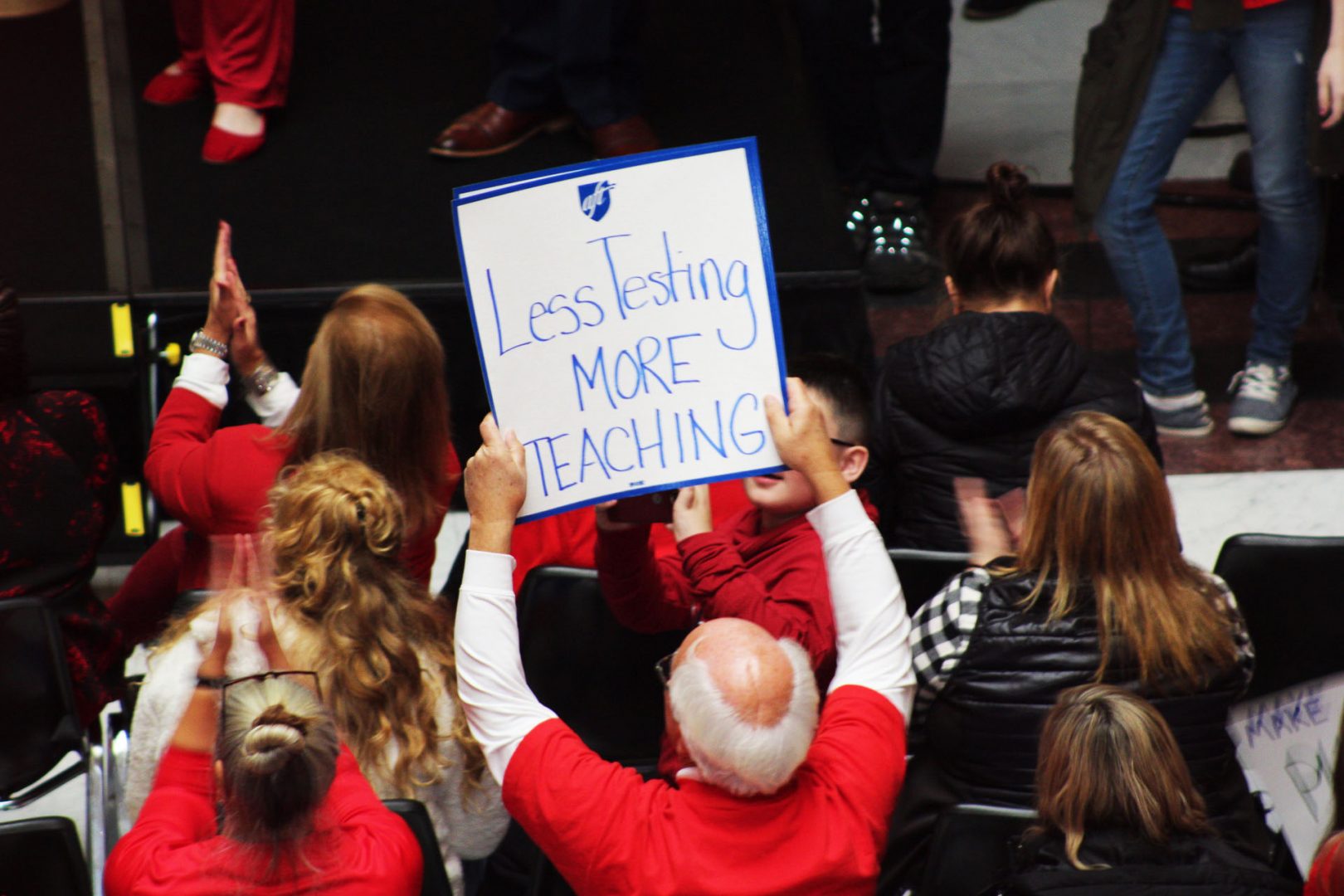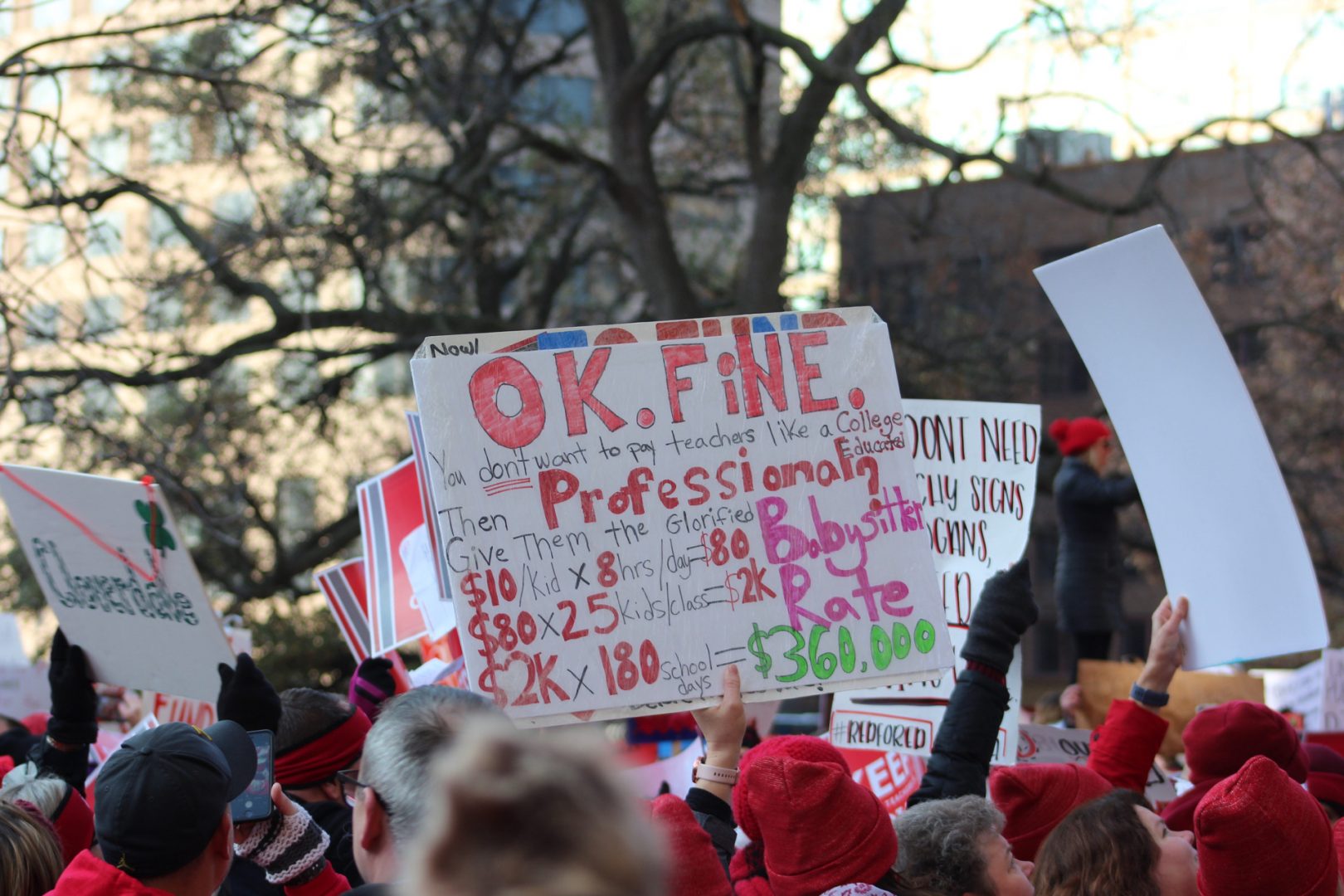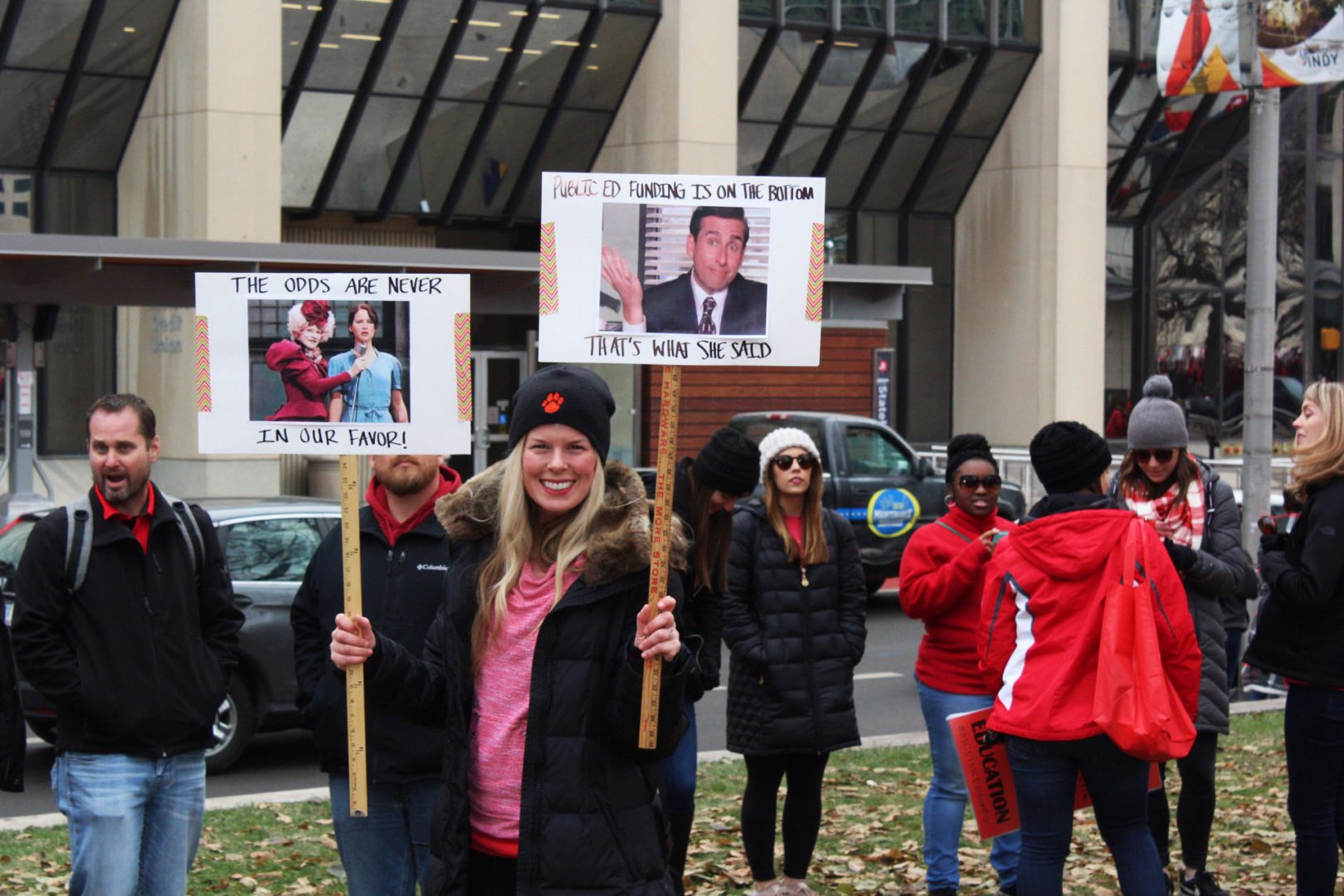“You left us with no choice, now we have to use our teacher voice,” thousands of protestors outside of the Indiana Statehouse chanted at the Red for Education Action Day protest and march yesterday. People from all across Indiana attended the event to advocate for better education policy, more funding, less standardized testing, increased teacher salaries and more.
Members of the Indiana State Teachers Association, along with educators, students and community members marched around the Statehouse and its surrounding government buildings in Downtown Indianapolis, chanting and holding signs in support of their values and needs. More than half of the public school districts in Indiana closed for the day or substituted their regular class time with an e-learning day or an employee workday in solidarity with the event, according to The Indianapolis Star.
John Kuykendall, associate professor and dean of the University of Indianapolis School of Education said in a statement of support that the SOE supports the efforts of Indiana school teachers and what they are trying to provide to their students.
“To take this great stand, and fight for what is right, is a freedom we all should exercise when we feel unsupported,” Kuykendall said. “Almost all of the future teachers at the University of Indianapolis will be employed in public schools. We hope the Red for Ed Day events lead to progress that will adequately support the improvement of public schools and the teachers that serve in them.”
UIndy senior elementary education major Alexia Hines was at the Statehouse and said she hopes Red for Ed Action Day shows legislators and non-educators that teachers and students deserve more than what they currently receive. Something has to change, she said.
“I attended the Red for Ed Action Day because I believe children are our future leaders,” Hines said. “They’re our future politicians, surgeons, teachers, decision-makers and the list goes on. Without adequate funding… our children are being robbed of this early on and it is affecting their futures.”
Hines said that, to her, Red for Ed means that students will be prepared for the future because they will have the necessary resources and materials they need to succeed in life. Hines said she attended Red for Ed Action Day because there are minimal educators in politics making laws about subjects they don’t know anything about, because they’ve never taught a lesson.
Teachers from school districts across Indiana were among the 15,000 registered attendees at the event. Among those was Marla Arnold, a teacher at the Southwest Jefferson County Consolidated School Corporation in southern Indiana. Arnold said that she attended the event to support education and wanted her voice and the voices of all of the others in attendance to be heard.
“It’s not that we wouldn’t love to get paid more, but the biggest thing is that public education is not being funded adequately,” Arnold said. “If there is ever a [financial] cut, it comes out of public education first and foremost. That’s why we’re all here.”
Arnold said that she wants Indiana to understand that teachers are voters that can have an effect on legislation.
“If we have a test that, as a state, everyone fails, how are you [the state of Indiana] saying that the teachers failed?”
In a statement released by Gov. Eric Holcomb on Nov. 19, he said that the event was a great opportunity for people to express their voice at the Statehouse. Gov. Holcomb said that it is essential to retain and attract great teachers to ensure the highest quality education for Indiana students.
“I remain committed to finding long-term sustainable solutions to increase teacher compensation,” Holcomb said. “That’s why I created the Next Level Teacher Compensation Commission and signed our recent two-year budget that included historic levels of increased funding for K-12.”
Following the march around the Statehouse, activists were invited inside to listen to remarks from various public figures and union leaders in support of the event. Over 5,000 people went inside the Statehouse after the march, according to the Indiana State Police.
Dustin Jovanovich, a second-grade teacher at Rockville Elementary School, located in Parke County in western Indiana, said that the need for major funding for his school corporation, North Central Parke Community School Corporation, increasing class sizes and the 15-hour externship that was required for him by the state to renew his teaching license pushed him to attend Red for Ed Action Day.
“I’m in my 11th year of teaching,” Jovanovich said. “The class sizes keep getting bigger, the funding keeps going down, they [Indiana board of education] expect more… it’s becoming overwhelming.”
Jovanovich said that these stresses have taken away some of the fun from teaching. He said that because of the strictly regimented curriculum there is not really any room for fun.
Megan Bride, a kindergarten teacher at Turkey Run Elementary School in Parke County, said that Indiana has been spending too much money on high-stakes testing such as I-LEARN and also the previous test, ISTEP. Bridge said that on top of the high-stakes testing, kids are not able to play and grow socially and emotionally due to the increasing academic pressures.
“If we have a test that, as a state, everyone fails, how are you [the state of Indiana] saying that the teachers failed?” Bridge said. “We’re the same teachers from years previous and this is a new test.”
Bridge said that it will be hard for her to stay in an education career without an increase in funding. According to Bridge, being in her fifth year of teaching and a mother of two, she has little to show for it financially.
“When it comes time to do anything big, like saving for college, first cars, even putting them in sports, that’s not going to be a reality,” Bridge said.
Bridge said that voters should think about what is best for the students because if voters want good education, they need to invest in education. According to Jovanovich, approximately 90 percent of Indiana students are in public education.
“We have standardized testing, but we don’t have standardized kids,” Jovanovich said. “It’s hard to place the relevance of a test on a certain kid. It affects the entire school corporation, whether you’re in a testing grade or not.”































